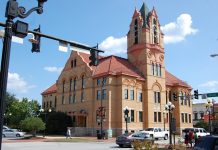By Stan Welch
Last year, the South Carolina General Assembly had that rarest of government occurrences – a large budget surplus. Despite their lack of recent experience with such things, the General Assembly voted to return some of that money to the various counties to be used in road paving. Anderson County received a one time windfall of $7.5 million to be used on local roads. These special funds will be used to repave and repair a list of projects over the next two years.
The Anderson County Transportation Committee (ACTC), which oversees the County’s annual allocation of state C funds, which come from the state gasoline tax employs a consulting company, CoTransCo which handles engineering matters and bidding such projects out.
The special paving funds will be overseen by the ACTC, with guidance from the consulting firm. The funds will be spent over two years, with the proviso that the prices received in the bid process will be locked in for that period.
County Administrator Rusty Burns told The Journal in a telephone interview this week that the improving weather, which had previously restricted county paving efforts to patching and minor projects, will allow the beginning of some of the bigger projects in the near future.
“We expect to see the contractors getting busy soon, as well as the county road crews. Of course, the municipalities around the county will be seeing the benefits of this as well. In earlier times, there was a distinction drawn between municipal roads, county roads, and state roads. The formulas used to determine how many miles were inside a town’s limits, or outside, were complicated, and frankly, unnecessary. In most cases, many of the roads that run through our smaller towns are state and county roads. The county’s viewpoint is that all these roads are connected.”
When the funds were first secured, the ACTC asked the various municipalities to submit a list of town roads that they would like to see paved or repaired. Some towns were slow to do so, and had to be reminded in order to get in under the deadline for submitting such lists. Others submitted some rather elaborate plans that were considered by members of the ACTC to be beyond their proper scope.
“We were tickled to get that money after years of what we considered inadequate funding. So to see plans submitted for lighted, landscaped boulevards didn’t set too well with some of us. Our focus was on putting as much asphalt in the right places as possible”, said one member who asked not to be identified. “Some of these towns wanted to use the windfall for fancy projects while expecting us to use the regular C funds to do the heavy lifting.”














